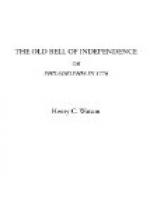“’After this, Mr. Duche, unexpectedly to every body, struck out into an extemporary prayer which filled the bosom of every man present. I must confess I never heard a better prayer, or one so well pronounced. Episcopalian as he is, Dr. Cooper himself never prayed with such fervor, such correctness and pathos, and in language so elegant and sublime, for America, for Congress, for the province of Massachusetts Bay, especially the town of Boston. It has had an excellent effect upon every body here. I must beg you to read that psalm. If there is any faith in the sortes Virgilianae, or sortes Homericae, or especially the sortes Biblicae, it would be thought providential.’
“The thirty-fifth psalm was indeed appropriate to the news received, and the exigencies of the times. It commences:—
“’Plead my cause, O Lord, with them that fight against me.
’Take hold of shield and buckler, and stand up for my help.
’Draw out also the spear, and stop the way against them that persecute me: say unto my soul, I am thy salvation.’
“What a subject for contemplation does this picture present. The forty-four members of the first Congress, in their Hall, all bent before the mercy-seat, and asking Him that their enemies ’might be as chaff before the wind.’ Washington was kneeling there; and Henry and Randolph, and Rutledge, and Lee, and Jay; and by their side there stood, bowed in reverence, the Puritan patriots of New England, who, at that moment, had reason to believe that an armed soldiery was wasting their humble households. It was believed that Boston had been bombarded and destroyed. They prayed fervently ’for America, for the Congress, for the province of Massachusetts Bay, and especially for the town of Boston;’ and who can realize the emotion with which they turned imploringly to Heaven for divine interposition and aid? ’It was enough to melt a heart of stone. I saw the tears gush into the eyes of the old, grave Quakers of Philadelphia.’”
“Yes,” said Wilson, when young Harmar had concluded, “that was a scene equal, at least, to the one on the eve of Brandywine: how finely old John Adams speaks about it!”
“That Dr. Duche forgot his connexion with the Church of England, and only thought of his country,” remarked Morton. “He was a good man.”
“Yes; and he prayed in the presence of as good a set of men as was ever assembled together,” added Smith. “Them was men—those Congressmen. They didn’t get eight dollars a day for making speeches.”




